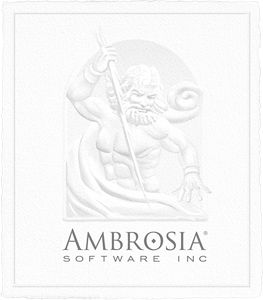Ambrosia Software facts for kids
 |
|
| Private | |
| Industry | Software, video games |
| Founded | August 18, 1993 |
| Defunct | July 19, 2019 |
| Headquarters | Rochester, New York, U.S. |
|
Key people
|
Andrew Welch |
| Products | Shareware video games and utilities |
Ambrosia Software was a company that made computer programs. They mostly created software for Macintosh computers. The company started in 1993 in Rochester, USA. Ambrosia Software was well-known for making new versions of classic arcade games. Their first game was a remake of the 1979 game Asteroids. They also made many helpful computer tools.
Ambrosia's programs were often shared as "shareware." This meant you could download and try a demo version for free. You could usually use it for about 30 days before deciding to buy it. Later, the company also released some programs for iOS devices like iPhones. One of their most popular tools was Snapz Pro X. This program helped users capture images and videos from their computer screen.
Around 2017, customers found it hard to reach the company. People could no longer buy new programs. By July 2019, the company's website was no longer working.
Contents
The Story of Ambrosia Software
How It Started
Ambrosia Software officially began on August 18, 1993. It was founded by Andrew Welch. He started the company after finishing his studies at the Rochester Institute of Technology in 1992.
The very first game Ambrosia made was Maelstrom. This game came out in 1992. It was a new version of the old 1979 arcade game Asteroids. Maelstrom was very successful and won several awards. Because of this early success, Ambrosia decided to make more arcade-style games. They created games like Apeiron, which was like Centipede. They also made Swoop, similar to Galaxian, and Barrack, like JezzBall. A magazine called Macworld noted in 1999 that Ambrosia was great at updating older arcade hits.
The End of Ambrosia Software
In 2013, most of the company's ten employees were laid off. However, Andrew Welch said the company was not shutting down. But in late 2018, the last employee announced that Ambrosia was officially closing its doors.
What Programs Did Ambrosia Make?
Ambrosia Software created many different types of programs. They made fun games and useful tools for computers.
Fun Games They Made
Ambrosia made many games, often inspired by classic arcade titles. Here are some of their well-known games:
- Maelstrom — A remake of Asteroids.
- Apeiron — A remake of Centipede.
- Swoop — A game similar to Galaxian.
- Barrack — A game similar to JezzBall.
- Escape Velocity — A popular space adventure game series.
- Bubble Trouble — A remake of Pengo.
- Harry the Handsome Executive
- Mars Rising
- Ferazel's Wand
- Escape Velocity Nova — Another game in the Escape Velocity series.
- GooBall
- Darwinia — A game ported to Mac OS X.
- SketchFighter 4000 Alpha
- DEFCON — A game ported to Mac OS X.
- Aquaria — A game ported to Mac OS X.
Helpful Tools They Made
Besides games, Ambrosia also made many useful utility programs. These tools helped people do different things on their computers. Some of their notable tools include:
- Eclipse — A screen saver program.
- FlashWrite — A simple text editor.
- EasyEnvelopes — A tool for printing envelopes.
- Snapz Pro X — A popular program for capturing screen images and videos.
- WireTap Pro — A tool for recording audio.
- iToner — A utility for transferring custom ringtones to iPhones.
- WireTap Studio — A program for recording, editing, and storing audio. It won an award in 2007.
- Soundboard — A tool for playing back audio on a computer.
One of Ambrosia's main ideas was that shareware should not be "crippleware." Crippleware means a program has important features turned off in the demo version. Instead, Ambrosia's software used an "honor system." You could try the program for free, and it would just remind you that you were using an unregistered version. This was sometimes called "nagware."
Later, Ambrosia changed this policy. They started using more typical ways to prevent people from using unregistered copies forever. For example, in their Escape Velocity games, a character named Hector the Parrot would attack players using unregistered copies after the trial time ended. This meant their software became more like crippleware.
Now that the company is no longer active, they do not provide new license codes. This means that even customers who bought Ambrosia software might find their programs acting like expired trial versions. For example, in the Escape Velocity games, Cap'n Hector's attacks might not stop.

